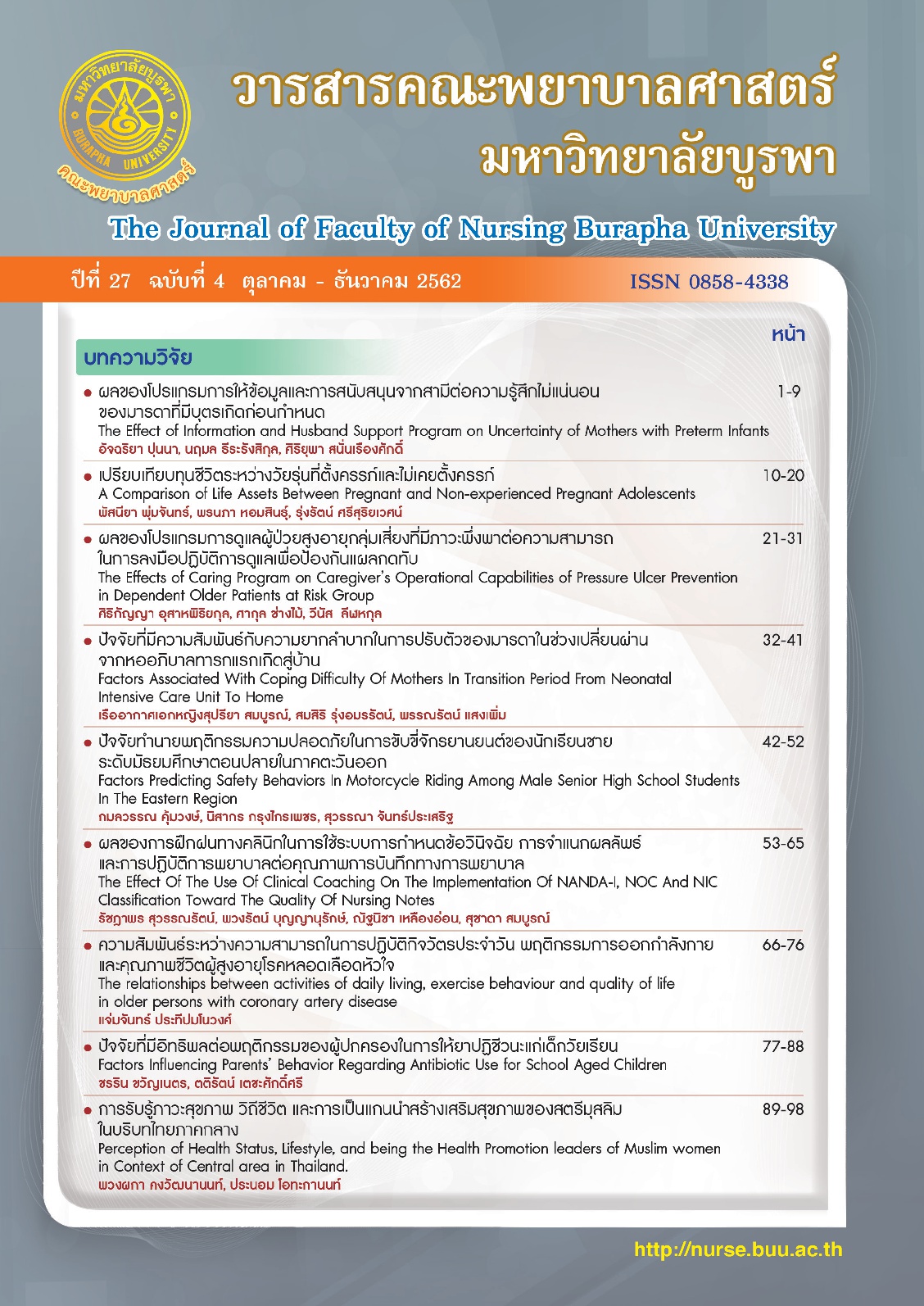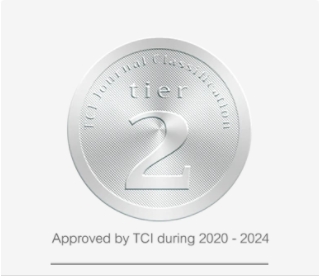การรับรู้ภาวะสุขภาพ วิถีชีวิต และการเป็นแกนนำสร้างเสริมสุขภาพของสตรีมุสลิมในบริบทไทยภาคกลาง
คำสำคัญ:
ภาวะสุขภาพ, วิถีชีวิตมุสลิม, แกนนำ, สตรีมุสลิมบทคัดย่อ
บทคัดย่อ
การศึกษาเชิงคุณภาพนี้มีวัตถุประสงค์เพื่อทำความเข้าใจการรับรู้ภาวะสุขภาพ วิถีชีวิต และการเป็นแกนนำด้านการสร้างเสริมสุขภาพของสตรีมุสลิม ในบริบทชุมชนมุสลิมไทยภาคกลาง ศึกษาจำนวน 24 คน อายุ 25 -71 ปี จากการเลือกแบบเจาะจงและการบอกต่อ เก็บข้อมูลจากการสนทนากลุ่มและสัมภาษณ์เชิงลึก จนกระทั่งข้อมูลอิ่มตัว สร้างความน่าเชื่อถือด้วยวิธีตรวจสอบสามเส้า และใช้การวิเคราะห์เนื้อหา ได้ข้อค้นพบคือ สตรีมุสลิมรับรู้ภาวะสุขภาพตนแข็งแรงดีร้อยละ 66.2 ปัญหาสุขภาพที่พบ คือ ภาวะอ้วน ภาวะไขมันในเลือดสูง เบาหวาน และความดันโลหิตสูง ตามลำดับ ผู้หญิงมุสลิมให้ความหมายต่อการเป็นแกนนำการสร้างเสริมสุขภาพ มีสาระสำคัญ 3 ประการ คือ 1) แกนนำสตรีต้องยึดหลักปฏิบัติของศาสนาอิสลามกับการเป็นผู้หญิงที่ดี: ดูแลลูกดี เชื่อฟังสามี ทำให้ทุกคนในบ้านมีความสุข และเป็นผู้นำเมื่อไม่มีชายในบ้าน 2) แกนนำสตรีมุสลิมต้องมีคุณสมบัติผู้นำทั่วไป: กล้าพูด กล้าทำ นำคนอื่นได้ 3) แกนนำต้องมีสุขภาพดีก่อน จึงจะนำผู้อื่นได้ ทั้ง กาย จิต สังคม การรู้ดีชั่ว และสิ่งแวดล้อม ข้อค้นพบนี้ชี้ให้เห็นว่า การจะสร้างแกนนำสตรีมุสลิม ต้องทำความเข้าใจ บริบทสังคมมุสลิม แนวปฏิบัติในหลักศาสนาอิสลาม ความต้องการและข้อจำกัดของสตรีมุสลิม ข้อความรู้ที่ได้นักสุขภาพสามารถนำมาทำความเข้าใจและสร้างแนวทางพัฒนาแกนนำสตรีมุสลิมในการสร้างเสริมสุขภาพที่เหมาะสมและมีประสิทธิภาพต่อไป
References
Anuwatyanyong A. (2007). Health Care during the Month of Ramadan in a Community Dimension. [updated: 2007; cited 2017 July 10]. Available from: http://www.annisaa.com/forum/index.php?topic=683
Bakao, N., Yoloa, D., KijTham, W., & Chanprasert, T. (2013). Self-Management and Family Coping Toward a Happy Warm Family of Muslim Married Female Teachers: a Case Study of Yala Province. AL-NUR Journal, 5(9), 83-96. [In Thai].
Campimha-Bacote, J. (2003). A model and instrument for addressing cultural competence in health care. Journal of nursing education, 38(5), 203-207.
Chanocha Prayut. [updated: 2018; cited 2018 December 22]. Available from: http://www.hfocus.org.
Chirawatkul S, Hanirattisai, T, Buaboon, N, Sirisaeng, P, Kongvattananon, P, Kittiwatphosan, W. et al. (2015). Sexual Paradigms and the Prevention of and Response to Teenage Pregnancy Problems in the Thai Society. The Journal of Health Science, 24 (2), 378-388. [In Thai].
Cohen, J. (1988). Statistical power analysis for the behavioral sciences. (2nd Ed.). Hillsdale, N.J.: Lawrence Eribaum associates.
Creswell, J.W.& Poth, C.N. (2018). Qualitative Inquiry Research Design. Choosing among five Approaches. 4rd ed. California: SAGE Publications.
Foundation of Thai Gerontology Research and Development Institute, (2010). https://krupaga.wordpress.com 3/3/2558
Gill, A.K. & Mishra, A. (2018). Impact of self Help Groups in Empowering Women: A Study of Rural Assam. International Journal of Management, Law & Science Studies, 2(6), 56-62.
Giorgi, A. (2009). A descriptive phenomenological method in psychology: A modified Husserlian approach. Pittsburgh, PA: Duquesne University Press.
Jampaklai A, Prasitthihima A, Sakunsri A. (2012). The Muslims of Thailand: Borderline or Simply Different. The Journal of Population and Social Research, 16(2): 84-104. [In Thai].
KlongLuang Municipality. [Updated: 2017; cited 2017 Febuary 3]. Available from: http://www.klongluang.go.th.[In Thai]
Miers, M. (2002). Developing an understanding of gender sensitive care: exploring concepts and knowledge. Journal of Advanced Nursing, 40(1), 69-77.
Phanich W, Intharaprasoet C, Limsuphawanit W. Lessons Learned of the 18th Technical Meeting of the HA National Forum, Topic “KM 4.0, New Dimensions in Instruction Management,” Wednesday, March 15, 2017 at 19:30 AM to 12 Noon in Room Sapphire 203, IMPACT Forum Convention Center, in Mueangthong Thani, Mahidol University; 2017 March.[in Thai]
Patton, M., Q. (2015). Qualitative Research & Evaluation Methods. 4th ed. Thousand Oaks, CA: SAGE Publications.
Pender, N.J., Murdaugh, C.L., & Parsons, M.A. (2015). Health Promotion in Nursing Practice. 7thed. Boston: Pearson Education.
Sakunpanyawat S. (2014). Health-promoting behaviors of elderly Muslims: Case study of the Thumbol of Ongrak, District of Ongrak, Nakhon Nayok. The Army Journal of Nursing, 15(3), 353-360. [In Thai].
Wiwannachit, S., Lungpotae, P., Magang, M., Sulong, W., & Galeya, S. (2017). Muslin women’s social space and health empowerment through physical activities amid unrest situation in Southernmost Provinces (phase I). Bangkok; HSRI.
Streubert, H. J. & Carpenter, D.J. (2011). Qualitative Research in Nursing: Advancing the Humanistic Imperative. 5th ed. Woltors Kluver Health & Williams and Wilkins.
Sundstrom, A. & Wangnerud, L. (2018). Women’s Empowerment at the Local Level. Measuring Women’s Politcal Empowerment across the Globe, 2(3). 117-137.
The Islam foundation. The Islam foundation. [updated: 2018; cited 2018 February 10]. Available from: http://islamhouse.muslimthaipost.com/main/index
Trivedi, S.B. (2018). Achieving Gender Equality and Women Empowerment in India (SDGS-5) Opportunities and Challenges. Multidisciplinary Higher Education, Research, Dianamics & Concepts, Opportunities and Challenges for Sustainable Development, 1(1), 220-232.
Wangsom, A., Kongvattananon, P., & Somprasert, C. (2018). Conducting the Focus Group of Novice Nurse Qualitative Researchers: A Literature Review. The Songklanagarind Journal of Nursing. 38(1), 81-86.
World Health Organization. (2009). Milestones in Health Promotion Statements from Global Conferences. Geneva: World Health Organization.





